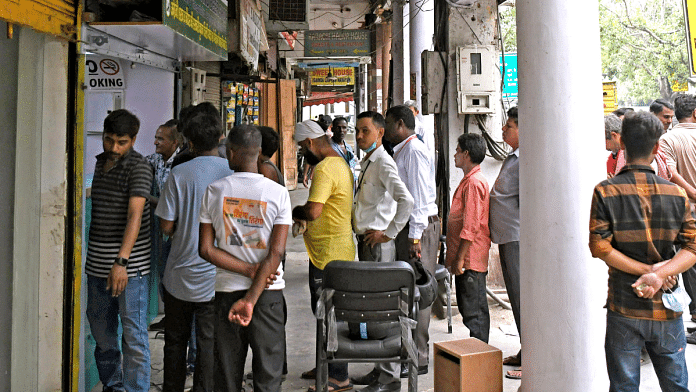New Delhi: Government liquor vends will continue to dominate the retail sector in Delhi at least for another six months. Senior government officials have confirmed to ThePrint that the Arvind Kejriwal government’s existing policy has been extended until 31 March, 2024.
The current policy expires on 30 September. This is the third such extension since August-September 2022, when the 2021-22 policy was scrapped over allegations of irregularities.
ThePrint reached senior officials in Delhi’s excise department for comment via calls and text messages, but did not get a response. This report will be updated if and when a response is received. However, a senior Delhi government official said on condition of anonymity that no fresh excise policy has been finalised due to an ongoing investigation into previous one.
A government source told ThePrint that the excise department has been “walking on eggshells” in connection with the controversy over the 2021-22 policy, which eventually led to the arrest of former deputy chief minister Manish Sisodia and suspension of former excise commissioner Arava Gopi Krishna.
“The department wanted to push for changes and do away with certain old provisions, such as the restrictions on microbreweries, where the beer can only be sold on the premises, and which does not allow kegging or bottling,” said the source.
Under the provisions of the existing excise policy, the retail sale of liquor is handled by government vends, apart from the sales in hotels, clubs and restaurants. This is as opposed to the controversial 2021-22 policy, under which the sale of liquor was completely handed over to private players. The goal under that policy was to open nearly 850 liquor vends in the city and bring in the concept of a walk-in liquor buying experience.
“As things stand in the current scenario, there is no fresh excise policy in sight,” the government source told ThePrint.
But liquor companies are seeking better clarity on the regulatory framework.
According to Vinod Giri, director general of the Confederation of Indian Alcoholic Beverage Companies (CIABC), the current policy was meant to be a stop-gap measure to prevent a regulatory vacuum due to sudden withdrawal of the new excise policy of 2021-22.
“It is now being extended repeatedly just to keep business going. It is not a planned excise policy design to work for all stakeholders. What the industry needs more than anything else is regulatory stability,” he told ThePrint.
Also Read: How the non-brand-conscious drinker saved Delhi revenues from excise policy hit
Call for regulatory stability
While the business process for issuing licences for the next six months is set to begin soon, the excise department is actively looking to increase the number of premium liquor vends in the city, said the government source.
Unlike the standard government vends, premium liquor vends provide a walk-in experience along with trained staff and chillers.
Currently, there are 48 such vends in the city, while the overall count of liquor vends, as of 8 August, stands at 617, according to the excise department website.
However, excise officials said that at least 1,500 liquor vends are required to cater to the city’s needs.
In the current scenario, regular government vends lack facilities such as chillers, a wider range of alcohol and trained staff. In addition, a walk-in experience remains absent for customers, with many queuing before counters.
But this lack of clear long-term policy means that companies cannot make long-term plans. According to Giri, quoted earlier, there needs to be some clarity on the policy front at least over the next year or two.
“In recent times we have seen frequent major changes in excise policy which have had an unsettling effect on the industry. Furthermore, even though the policy is extended for a few months every time, the department charges a fee for the full year. That’s against all norms of fair trade,” he said, adding that if the situation continues, companies who have an option of supplying elsewhere in the country will hesitate to stock up in Delhi.
(Edited by Uttara Ramaswamy)



